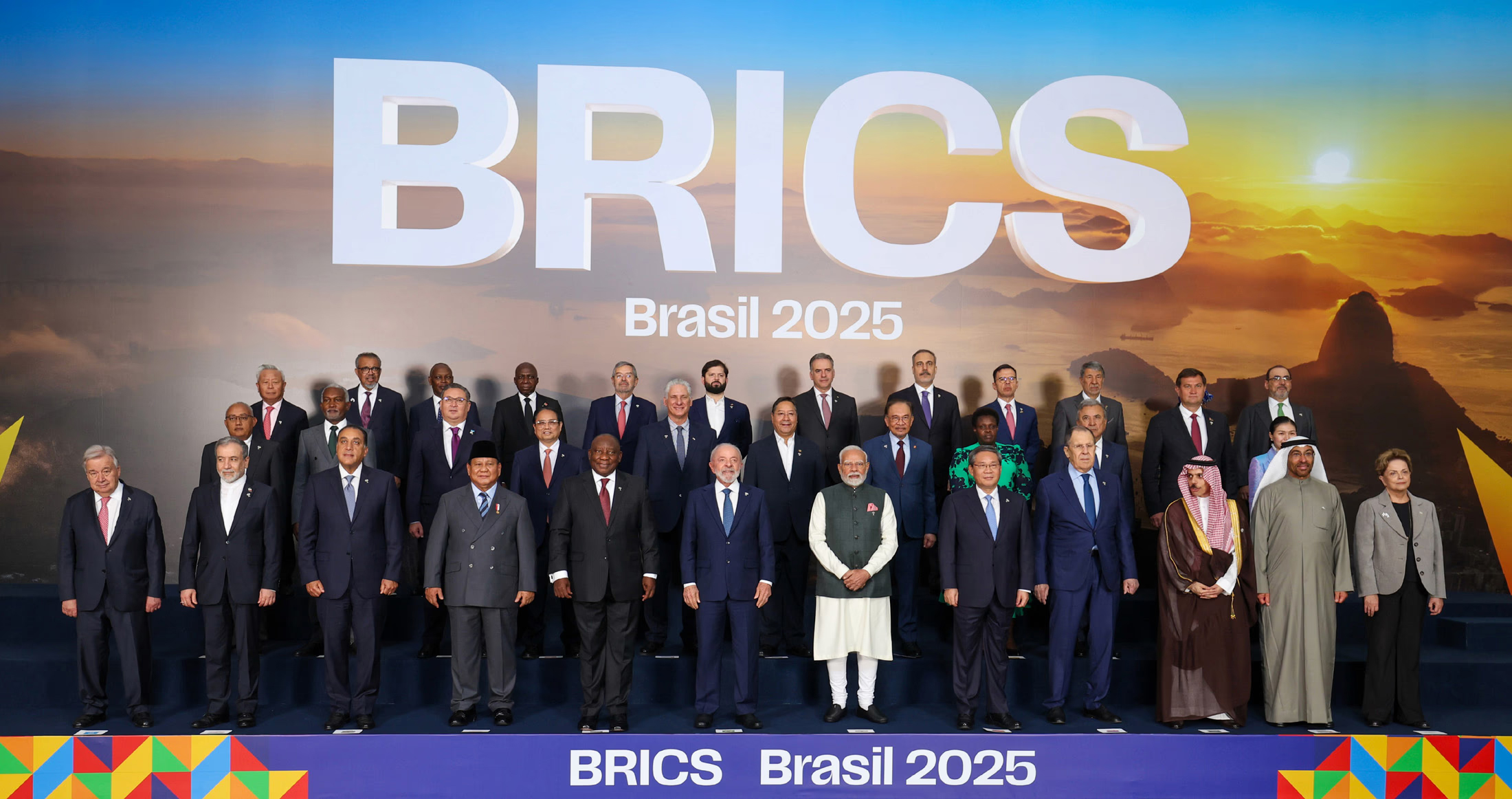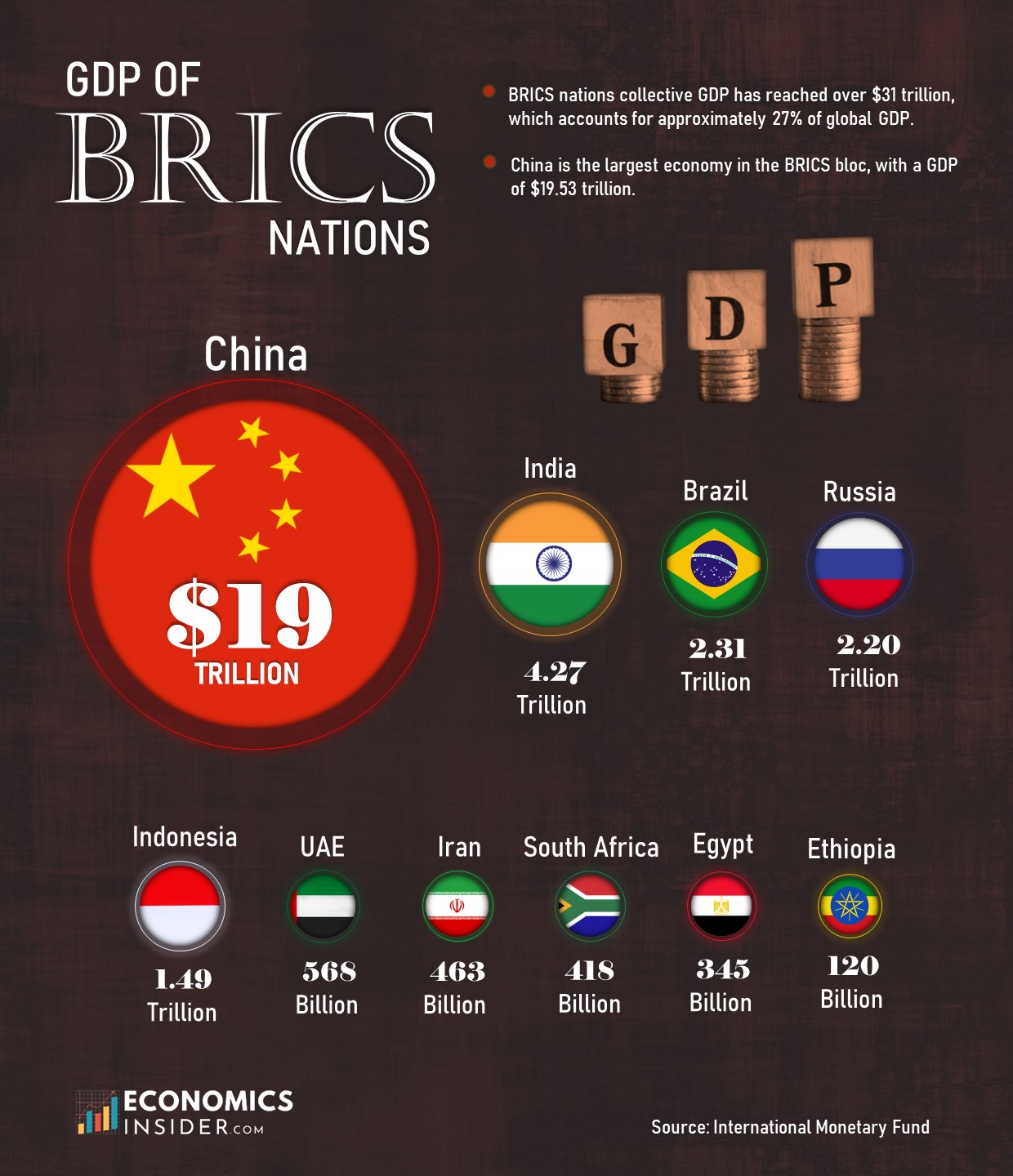Context-
The 17th BRICS Summit, held in Rio de Janeiro on 6–7 July 2025, marked an important moment for this group of emerging economies. This was the first summit attended by all the new members—Egypt, Ethiopia, the United Arab Emirates, Iran, and Indonesia—reflecting BRICS’s ambition to expand its role in global affairs.
The meeting took place against a backdrop of significant international tensions, including the U.S.-Israel attacks on Iran’s nuclear facilities, the continued conflict in Gaza, and the recent India-Pakistan hostilities. These developments, along with the outcomes of the G-7 summit in Canada, underlined the deep divisions shaping the current global order.
Although there were challenges, such as differences over United Nations reforms and criticism from the United States about BRICS’s economic agenda, the Rio Declaration demonstrated a shared commitment to cooperation. With BRICS now representing almost half of the world’s population, 40% of global GDP, and a significant share of world trade, India’s upcoming leadership in 2026 will be crucial in guiding the group’s efforts to promote a fairer and more inclusive international system.
Key Highlights of the Summit:
Trade and Economic Concerns: Before the summit, the US warned BRICS countries against taking steps to challenge the dollar. Although the final declaration did not call for replacing the dollar, it criticised unilateral tariff and non-tariff measures that distort trade, hinting at recent US policies.
It also highlighted risks of protectionism disguised as environmental measures, referencing the European Union’s proposed Carbon Border Adjustment Mechanism, which could hurt exports from developing economies.
Reform of Global Institutions: A key theme was modernising international organisations:
- BRICS called for updating the United Nations, World Bank, IMF, and WTO to better represent developing countries.
- Notably, China and Russia expressed support for Brazil and India playing a larger role in the UN Security Council, although without formally endorsing their permanent membership.
- The declaration urged restoration of the WTO dispute settlement system, which remains stalled.
These positions reflect frustration with the slow pace of reform in institutions created after World War II.
Middle East and Palestine
The summit issued strong statements on the situation in Gaza, likely influenced by new members from the Middle East. The declaration:
- Voiced grave concern about Israeli military operations and the blockade of humanitarian aid.
- Called for an immediate ceasefire and withdrawal of Israeli forces.
- Endorsed an independent Palestinian state combining the West Bank and Gaza.
Counterterrorism and India’s Priorities: For India, the summit produced a clear diplomatic gain. The declaration:
- Condemned the terror attack in Jammu & Kashmir on April 22, 2025.
- Reaffirmed commitment to fighting terrorism in all forms.
- Highlighted cross-border movement of terrorists and terror financing, strengthening India’s position in global forums such as the Financial Action Task Force (FATF).
G20 and Multipolarity: As the G20 faces challenges due to disagreements between the US and South Africa, BRICS leaders stressed that the G20 remains the main platform for global economic cooperation. They also reaffirmed support for South Africa’s G20 presidency, aligning with their broader vision of a multipolar world.
Other major Highlights of the Summit:
· Climate Finance: Adopted the Leaders’ Framework Declaration on Climate Finance, calling for accessible and predictable funding to help developing countries achieve climate goals.
· Artificial Intelligence Governance: Released the Leaders’ Statement on Global AI Governance, promoting responsible development and use of AI within national laws and in line with the UN Charter.
· Health Cooperation: Launched the Partnership for the Elimination of Socially Determined Diseases, aiming to reduce health disparities linked to poverty and exclusion.
· Africa-Focused Solutions: Supported “African solutions to African problems” in managing regional conflicts, including in Sudan and the Horn of Africa.
· Nuclear Non-Proliferation: Highlighted the contribution of nuclear-weapon-free zones to global security.
· Climate Diplomacy: Supported India’s proposal to host COP33 of the UNFCCC in 2028
The 2025 BRICS Summit in Rio de Janeiro marked a pivotal moment in the evolution of this influential coalition of emerging economies. While the summit produced ambitious declarations on trade, climate, and institutional reform, it also underscored persistent contradictions that could limit the bloc’s impact.
What is BRICS?
The term BRIC was coined in 2001 by a British economist to describe the rising economies of Brazil, Russia, India, and China. BRIC formally took shape as a group at the G8 Outreach Summit in 2006 and held its first standalone summit in 2009. In 2010, South Africa joined, transforming BRIC into BRICS.
Membership has recently expanded further:
- In 2024, Iran, Egypt, Ethiopia, and the United Arab Emirates joined the group.
- In 2025, Indonesia also became a member.
- Saudi Arabia has yet to formalise its membership, while Argentina, initially expected to join, decided not to.
The Contradictions within BRICS:
BRICS has always been an unusual coalition, grouping together countries with very different political systems, economies, and security interests. Its members range from liberal democracies like India and Brazil to authoritarian states like China and Russia. This diversity, while giving BRICS wide representation, also creates deep disagreements.
For example:
- India and China have serious disputes over their border and strategic competition in Asia.
- Saudi Arabia and the UAE are deeply concerned about Iran’s nuclear programme, even though Iran is now a BRICS member.
- Russia and China often push for an anti-Western narrative, which India and Brazil are less comfortable endorsing.
These differences make it difficult for BRICS to speak with one voice. While the Rio Declaration offered strong statements about global governance reforms and the importance of cooperation, it had little to say about how members will handle their own conflicting interests.
The Impact of U.S. Policy Shifts:
Ironically, while BRICS often talks about reducing American influence, it is the United States itself that is changing the international order most dramatically. Over the past year, the U.S. President has:
- Threatened to withdraw support from the World Trade Organization (WTO), weakening the system that regulates global trade.
- Sought major reforms in the World Bank and International Monetary Fund, echoing demands that BRICS has made for years.
- Imposed or threatened new tariffs on nearly all trading partners, including BRICS members.
Rather than creating an opportunity for BRICS to present a united alternative, these developments have caused many BRICS countries to seek separate bilateral deals with the U.S. to protect their own economies.
- China negotiated a limited trade agreement with Washington.
- Vietnam, another state wary of American tariffs, signed its own trade deal.
- India has been engaged in months of negotiations with the U.S., hoping for a favourable trade agreement.
This shows that even as BRICS talks about collective strength, its members continue to prioritise their national interests over group solidarity when faced with economic pressure.
Conclusion:
As India prepares to chair the BRICS summit in 2026, its diplomatic strategy will be critical. The challenge lies in converting the group’s aspirations—on financial independence, sustainable development, and inclusive growth—into practical outcomes.
BRICS is not a bloc in the traditional sense—it is a platform. It is a space for alternative voices in global governance, particularly from the Global South.
| Main question: BRICS has expanded its membership and articulated an agenda that seeks to reform global governance structures and reduce dependence on Western-dominated financial systems. Critically examine the opportunities and challenges this presents for India’s foreign policy and economic interests. |








